elementcollector1
International Hazard
    
Posts: 2684
Registered: 28-12-2011
Location: The Known Universe
Member Is Offline
Mood: Molten
|
|
Ampouling Gallium?
Is it possible to contain molten gallium metal in an ampoule to create a specimen for an element collection? In other words, when gallium freezes,
does it expand so much that it will crack the ampoule?
If this is the case, would slow cooling suffice to prevent this? I know that the reason hot glass shatters on contact with cold water is due to
thermal shock, so preventing such a drastic change would serve to protect the ampoule, correct?
Elements Collected:52/87
Latest Acquired: Cl
Next in Line: Nd
|
|
|
Finnnicus
Hazard to Others
  
Posts: 342
Registered: 22-3-2013
Member Is Offline
|
|
"Gallium expands 3.1% on solidifying, so it should not be stored in a metal or glass container that can break upon its solidification."
From About.com
For a comparison, water expands 9% on freezing.
[Edited on 29-9-2013 by Finnnicus]
|
|
|
violet sin
International Hazard
    
Posts: 1482
Registered: 2-9-2012
Location: Daydreaming of uraninite...
Member Is Offline
Mood: Good
|
|
so basically your container geometry needs to be right. could you not have some one blow a spherical ampoule and fill it max 45% or so? also small
glass christmas ornaments could be a short term answer. they have soft thin glass like an ampoule and the dye/silver inside is easy to remove.
shouldn't cost more than a few dollars for something better from a glass blower. no color, no super special shape, just a small sphere. that way you
could have fun and melt it from time to time in your hand, and as long as none got stuck in the irregular shape left at the point of sealing, it
should not break. just a thought.
-Violet Sin-
|
|
|
Pyro
International Hazard
    
Posts: 1305
Registered: 6-4-2012
Location: Gent, Belgium
Member Is Offline
Mood: No Mood
|
|
you could use a standard ampoule with only a few mm of gallium in the bottom, that way there would be no chance of breaking
all above information is intellectual property of Pyro.  |
|
|
12AX7
Post Harlot
    
Posts: 4803
Registered: 8-3-2005
Location: oscillating
Member Is Offline
Mood: informative
|
|
How pure is it, and how soft is pure gallium? If the glass is strong enough, it might contain it -- the metal extruding itself as it expands.
If you fill it on its side, so the liquid gallium occupies a shallow secant of the cylindrical cross-section, it should expand fairly freely. Just
make sure not to refreeze it in any other position?
Tim
|
|
|
bfesser
Resident Wikipedian
    
Posts: 2114
Registered: 29-1-2008
Member Is Offline
Mood: No Mood
|
|
I have a couple spherical ampoules if you need one.
|
|
|
BromicAcid
International Hazard
    
Posts: 3253
Registered: 13-7-2003
Location: Wisconsin
Member Is Offline
Mood: Rock n' Roll
|
|
I've had some products that I have made at work that expand on freezing and that are packed in wide mouth jars. They are poured in as liquids and the
jars are tilted to the side so when they freeze it can expand up the walls to some extent. Better than just having it sit flat in the bottom.
|
|
|
elementcollector1
International Hazard
    
Posts: 2684
Registered: 28-12-2011
Location: The Known Universe
Member Is Offline
Mood: Molten
|
|
Quote: Originally posted by Finnnicus  | "Gallium expands 3.1% on solidifying, so it should not be stored in a metal or glass container that can break upon its solidification."
From About.com
For a comparison, water expands 9% on freezing.
[Edited on 29-9-2013 by Finnnicus] |
So, a good test would be to see if water freezes in an ampoule without breaking it.
Elements Collected:52/87
Latest Acquired: Cl
Next in Line: Nd
|
|
|
Pyro
International Hazard
    
Posts: 1305
Registered: 6-4-2012
Location: Gent, Belgium
Member Is Offline
Mood: No Mood
|
|
just do it with Ga, you can easily separate it if it does break.
all above information is intellectual property of Pyro.  |
|
|
BobD1001
Hazard to Others
  
Posts: 182
Registered: 29-3-2013
Member Is Offline
Mood: No Mood
|
|
It honestly never occoured to me that the expansion of gallium when solidifying might crack glass. I recently put some solid pieces of gallium in a
vial to display on my periodic table, which is in my garage. This winter shouldn't be an issue as it will be too cold in there to liquify the sample,
however next summer that might become a relevant issue!
|
|
|
Sublimatus
Hazard to Others
  
Posts: 108
Registered: 8-6-2011
Member Is Offline
Mood: No Mood
|
|
I once made the mistake of putting ca. 50 mL of gallium in a glass screw-cap tube.
You get some gorgeous geometric crystal patterns up against the glass, but it did break. The mess wasn't too bad. Basically just a rod of gallium with
a bunch of broken glass around it.
A tube might survive if you continuously turned the container while the gallium crystallized. Of course if it remelts on a hot day, don't be
surprised to find the tube cracked later on.
For this reason I keep my gallium in an HDPE bottle, which can flex a bit.
|
|
|
MrHomeScientist
International Hazard
    
Posts: 1806
Registered: 24-10-2010
Location: Flerovium
Member Is Offline
Mood: No Mood
|
|
Another thing to consider is that gallium wets glass. Once molten, if you swirl it around inside your ampoule it will quickly coat all the walls and
you won't be able to see the liquid metal inside any more.
I actually used this property in my first sample of gallium for display in my collection - I melted it and coated the inside of a vial to give a (very
poor) mirrored surface. My current sample is made up of small beads that I made by melting the Ga, drawing it into a pipette, and gently dropping
blobs into cold water. Interestingly, it would pretty often supercool and stay as a liquid!
|
|
|
bismuthate
National Hazard
   
Posts: 803
Registered: 28-9-2013
Location: the island of stability
Member Is Offline
Mood: self reacting
|
|
this would be hard to accomplish but if there in no air in the ampoule the gallium cant freeze or stick to the glass.
|
|
|
Sublimatus
Hazard to Others
  
Posts: 108
Registered: 8-6-2011
Member Is Offline
Mood: No Mood
|
|
I've suddenly remembered that there's actually a video that shows gallium sealed in an evacuated ampoule. The gallium remains liquid and doesn't wet
the glass, bouncing around like mercury. Supposedly the latter property is achieved by coating the inside of the glass with some gallium oxide.
Take a look:
http://www.youtube.com/watch?v=12SFKUd32Ng
|
|
|
Fleaker
International Hazard
    
Posts: 1252
Registered: 19-6-2005
Member Is Offline
Mood: nucleophilic
|
|
Gallium oxide works (use it to coat crucibles when making alloy).
If the gallium is very clean (given a quick bit of aqua regia, then DI water) it won't wet glass.
Neither flask nor beaker.
"Kid, you don't even know just what you don't know. "
--The Dark Lord Sauron
|
|
|
elementcollector1
International Hazard
    
Posts: 2684
Registered: 28-12-2011
Location: The Known Universe
Member Is Offline
Mood: Molten
|
|
Quote: Originally posted by Fleaker  | Gallium oxide works (use it to coat crucibles when making alloy).
If the gallium is very clean (given a quick bit of aqua regia, then DI water) it won't wet glass. |
Would a nitrate salt and sulfuric acid substitute for the aqua regia?
Elements Collected:52/87
Latest Acquired: Cl
Next in Line: Nd
|
|
|
Fleaker
International Hazard
    
Posts: 1252
Registered: 19-6-2005
Member Is Offline
Mood: nucleophilic
|
|
Can't comment--never tried that.
Neither flask nor beaker.
"Kid, you don't even know just what you don't know. "
--The Dark Lord Sauron
|
|
|
bismuthate
National Hazard
   
Posts: 803
Registered: 28-9-2013
Location: the island of stability
Member Is Offline
Mood: self reacting
|
|
Yes it would work to clean the gallium because sulfuric acid will acid corrode gallium. ( I don't know about nitric but i would belive it does)
|
|
|
elementcollector1
International Hazard
    
Posts: 2684
Registered: 28-12-2011
Location: The Known Universe
Member Is Offline
Mood: Molten
|
|
My gallium looks very clean already, but I'll give it a clean with a dilute mixture of sulfuric acid and ammonium nitrate followed by a quick rinse in
distilled water, and dried off with isopropanol (this should suck up the water, and leave the gallium dry when it evaporates). Then, I'll ampoule it.
Sound good?
Elements Collected:52/87
Latest Acquired: Cl
Next in Line: Nd
|
|
|
bismuthate
National Hazard
   
Posts: 803
Registered: 28-9-2013
Location: the island of stability
Member Is Offline
Mood: self reacting
|
|
sounds great! Would you mind posting a picture?
|
|
|
elementcollector1
International Hazard
    
Posts: 2684
Registered: 28-12-2011
Location: The Known Universe
Member Is Offline
Mood: Molten
|
|
Sure thing! Before I do, a disclaimer: This attempt at cleaning gallium metal was half-assed, to say the least. I could have done a lot more, and
perhaps this is why the sample turned out the way it did in the end.
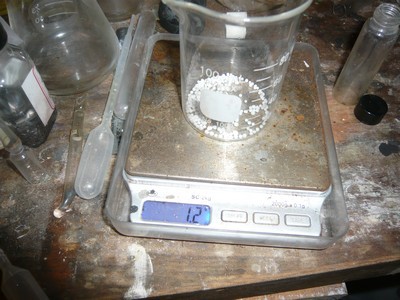
For starters, 1.2g of ammonium nitrate, followed by a lot of water and several drops of sulfuric acid. Shown here, next to the gallium's original
container.
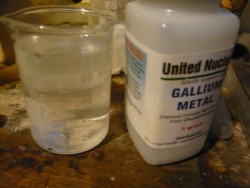
Quite a big container for just 1g, right? I don't have any pictures of the cleaning process, but rest assured that the lump of gallium didn't seem to
get any shinier - it already looked like 'clean' metal to me...
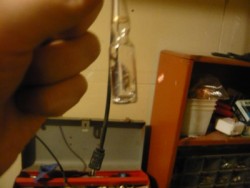
Terrible pic of the finished ampoule. Sometimes, I wish I had kristofagyok's equipment...
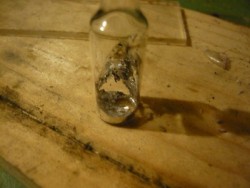
Slightly better pic. You can see where the gallium made a mirror on the ampoule wall - it actually made the sample look a little better, and if you
look closely you can see those odd hexagonal crystals on the mirror surface. Not in this picture, obviously.
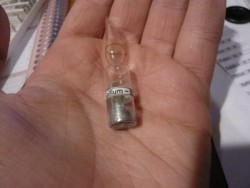
The finished, labeled sample, ready to go in my element collection. I have about 50 ampoules labeled just like this, and 94 more that aren't labeled.
Pretty neat!
The best conclusion I can draw from this is that these 1mL ampoules are resistant to gallium's freezing expansion, and are suitable for containing it.
I can also draw the conclusion that I probably needed to have melted the gallium in the cleaning solution in order to make it completely oxide-free.
Elements Collected:52/87
Latest Acquired: Cl
Next in Line: Nd
|
|
|